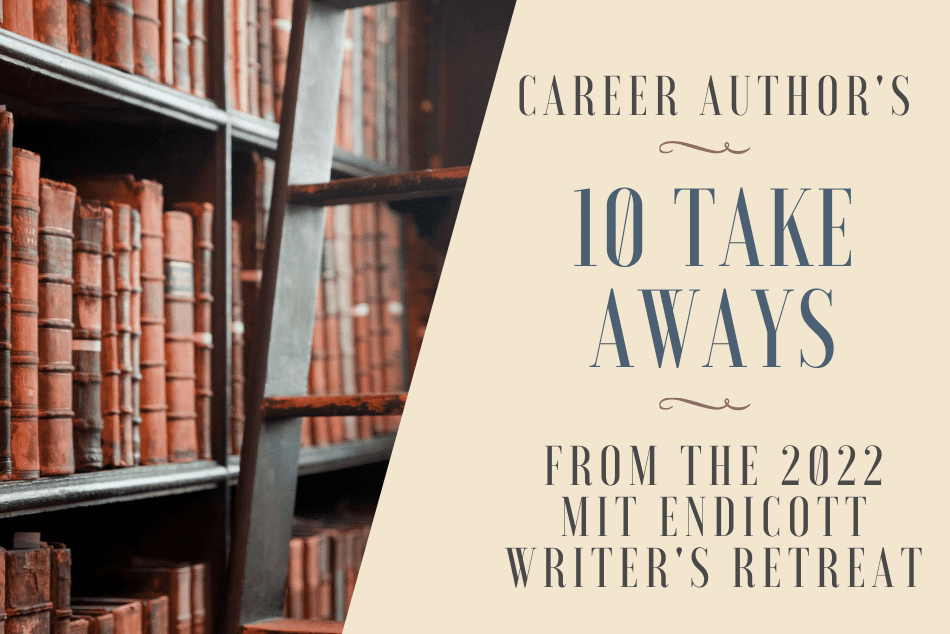by the Career Authors
This year we held our Career Author’s Writer’s Retreat in person at the beautiful MIT Endicott House. The turn out was fantastic and so was the feedback from the attendees! For those of you who hoped to attend but couldn’t make it, we wanted to share the Top 10 Take Aways from the event:
HANK
(1) Forget being a writer. Remember you are a storyteller. We all know the glory of hearing a compelling story told in an intriguing and understandable way–with a beginning and a middle and end, a character you care about, an important problem that needs to be solved, where the good guys win and the bad guys get what’s coming to them, and in the end, there’s some justice and the reader’s world is changed. When authors get bogged down in trying too hard, in trying to sound writerly, the story gets buried and disappears. Just tell a good story.
(2) Your log line is your best friend. It’s your go to when describing your book to a person who could change your life. And even more important, it serves as your guidepost in writing your book. Your log line is your North Star. It’s the essence of the story you are telling, and what makes that story unique and irresistible. And when a potential reader hears your log line, they should say “Oh! I cannot wait to read that!
PAULA
(3) Don’t send your work out too soon. This is the most common mistake new writers make. You usually get only one chance with an agent or editor, so give it your best shot. Writing is rewriting–so polish, polish, polish before you start sending out your work.
(4) Use your email subject line as a headline. Many agents don’t read unsolicited queries, but we all scroll through our email, and when something captures our attention, we stop and read it. Make yours count. Instead of Agent Query: Her Three Lives by Cate Holahan, try a tagline like “Gaslight goes high-tech,” which is the pitch I used for Cate’s fabulous thriller.
DANA
(5) Be strategic with your chapter endings. You might break off in the middle of an action scene. A cliffhanger is a good way to end a chapter, but not a good way to end every chapter. Also, cliffhangers can also be subtle: a new character might arrive, or a question might be asked of the reader. The chapter’s closing might signal a pause or a tonal change to the reader. Maybe something wise is imparted or someone cracks a joke. Vary the ways your chapters end.
(6) Edit with the reader in mind. An important distinction between bestselling authors and many who fail to reach that goal is the successful authors’ careful consideration of the reader experience. Working to make your book more accessible is not a matter of dumbing it down; it’s no easy feat to reach and connect at a gut level with a mass of readers.

JESSICA
(7) We are never done learning. As a part of the Career Authors team, it was humbling to look out from the podium of my session and see my fellow Career Authors furiously scribbling notes. These are people who’ve been in the business for many decades, combined—but then again, I’d been doing the same in their sessions! I hope the other attendees took note: That we’re never done taking in new ways of looking at the writing craft. We never reach a point where we’ve heard it all before, and you never know what might ignite new ideas. That’s magic.
(8) Titles matter from the get-go. Conventional wisdom may be that your book’s working title is just a placeholder… for now. But listening to dozens of writers pitch their projects aloud, there’s no denying that an irresistible title commanded the room’s attention immediately. Brainstorming new and improved titles as a group was a lot of fun… and perfectly illustrated why titles are important. The best ones not only turn heads (literally), but they’re instantly memorable, too.
BRIAN
(9) Practice your pitch. If someone asks you what your book is about, then you must be able to tell them in a clear, concise, and compelling way. In theory it sounds so simple, but in reality it’s hard. A pitch is not what “happens in your book.” A pitch is not “my character did this, and then did that, then went here, and oh I forgot to tell you about something else, which happened first…and yada yada yada. A pitch should have stakes. A pitch should have a hook. And most importantly, a pitch should roll off your tongue without you having to think about it.
(10) Mastering Point of View (POV) is the price of admission. If you want a seat at the publishing banquet, you must first master Point of View. Just like the door attendants at a black tie event will turn away party-crashers who show up in flip-flops and a tank top, agents and editors will turn down every aspiring author who hasn’t mastered POV. The harsh reality is this: authors who don’t understand and/or haven’t mastered POV might as well be wearing at name tag that says Amateur. It’s not a dig, just the truth. Even if your query is magnificent, and your pitch is perfect, and your concept is unique and compelling if the agent reading your submission finds POV cheats or confusion on the opening page, they will stop reading.
We covered a lot of ground at the retreat and had a great time too. It’s impossible to summarize every lesson and presentation, but this post hits the highlights.
One final bit of good news, MIT is having us back next year for another retreat, so book early because space limited so we can continue to offer lots of one-on-one time and personalized attention for the attendees. In the meantime, we’ve started a Career Author’s Endicott Facebook Page if you want to post photos, comments, or questions.






